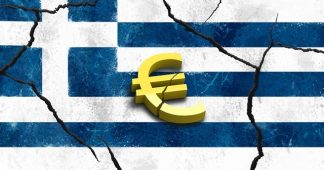By Dimitris Konstantakopoulos
04.07.2018
Greece still exists, albeit decapitated, without leaders, forces, or intellectuals to articulate its truth and its rights. And as it has proved, time and again, in thousands of years of a permanent threatened existence, the Greek people has a unique capacity to produce miracles, when nobody is waiting for them.
The Eurogroup (the Finance Ministers of the EU) decided to stop financing the Greek bailout program. They claim that both the program and the Greek crisis are over. Nothing can be more far away from the truth. In fact, announcements by European and Greek politicians concerning the end of the Bailout program or of the Greek Crisis, are nothing more than a gigantic Potemkin village, reflecting both the enormous impasse of the EU and the fantastic progress of totalitarianism in the Western world.
Greek sovereign debt remains “extremely non sustainable” according to the IMF. In reality, what Eurogroup did was to postpone once more the final decision on Greece. Greece will remain under very tight supervision of the EU until 2060. The IMF will remain in the program, but as an “advisor”. Its policies will remain, not its money. Germany has refused any debt relief, which would be the only solution to the Greek problem now, a method applied to Germany itself in the past, but also to Poland, Iraq and other western clients.
A Colossal Failure
The Greek program constitutes a gigantic failure, by far the biggest in the history of western leading economic institutions, like the IMF, the EU and the ECB.
Back in 2010, Greece was in a much more powerful position vis-à-vis its lenders, which were private banks and funds. Its debt was regulated by Greek law and its national parliament. Disputes related to the debt were under the jurisdiction of the Greek courts. Now the debt is owned by states and international institutions and ruled by the British Colonial law, the whole Greek public property has become a mortgage to the service of the debt, its constitutional protection lifted. Debt-related disputes are under the jurisdiction of foreign courts.
As a result of the bailout program implementation, Greece has known a loss of 27% of its GDP. Such a percentage is approximatively what happened in the US or Germany during the biggest crisis in the whole history of capitalism (1929-33), directly responsible for Hitler’s rise and WWII.
Up to half a million young, very well educated Greeks (5% of the whole population), absolutely necessary for any future development of the country have already emigrated abroad. More are prepared to follow. Greek investments and exports were cut to one third of what they were and only now they begin to approach half of it. Greek industry, commerce, much of services sector was decimated. Only agriculture and tourism were able to resist.
Education, health, social welfare expenses were radically cut, sometimes with tragic consequences, as people who are in need of vitally important medical treatment have to wait so much they die, if they don’t have money to afford private healthcare. Greek universities were particularly hit, losing 80% of their previous budgets.
Social rights earned during the past century were abolished. Disabled people and other vulnerable groups of the population were hardly hit. A wave of suicides has hit the country.
The Greek state was notorious for its ineffectiveness and bureaucracy. Now it is smaller and worse. Tax evasion has skyrocketed, as Greeks are unable to pay the exorbitant taxes imposed by the foreign creditors, which represent in some cases 70% of their income. Greeks lost also any moral incentive to pay taxes, especially in the social atmosphere dominating after their 2015 defeat by betrayal and the social capital in the country all but destroyed.
Most of Greek public property and much of private property was transferred to foreigners, including banks, transportation, energy and communications infrastructure of the country and all that for peanuts. What was not already sold was transferred to a special fund, for 99 years, to be automatically sold in case Greece does not obey the engagements. Germans, Americans, Chinese, Italians, Israelis, Arabs etc. are competing to get something out of the country. Only Russia is forbidden to participate in the plundering for geopolitical reasons.
The life expectancy and the general health of the population is declining, for the first time since 1950, people are thinking twice before having children, young Greeks emigrate, already long ago established and more or less integrated immigrants also. Next year, for the first time since WWII the total population of Greece is predicted to diminish in absolute terms and the percentage of Greeks in origin and conscience among the population is also declining.
A coup d’etat to achieve regime change
The imposition of the Greek program was a coup d’etat, but a coup d’etat in Carl Schmitt’s sense, one that is aimed at establishing a new regime, first in Greece, subsequently in all Europe.
This is exactly what makes the Greek experiment an operation of fundamental importance for the transformation of the Western social and political regime, representing a clear cut from the principles of popular and national sovereignty, on which Western regimes were based, at least in theory, after the French Revolution.
The architects of the Maastricht Treaty seem to have taken into account such a scenario and how to use it, when they introduced into the Treaty clauses forbidding the solidarity of the Union to its members. Goldman Sachs has also played a critical role from the very beginning to the creation of the Greek debt bubble problem, with its Greek swaps.
For regime change to be stable, it must produce the human beings which will accept it, even if accepting that means to accept passively the death of their country, of their nation and, finally, but only finally, the death of themselves. A similar procedure transforming a normal human being into a being praying for his own death is described by Kafka in his master piece The Trial.
Greece still exists, albeit decapitated, without leaders, forces, or intellectuals to articulate its truth and its rights. And as it has proved, time and again, in thousands of years of a permanent threatened existence, the Greek people has a unique capacity to produce miracles, when nobody is waiting for them.
The geopolitical consequences of the Greek “experiment”
Europeans have mobilized hundreds of billions of euros to implement this program, but less than 5% of that remained in Greece, most of the money was used to pay back German, French, Belgian, or Italian banks.
By making Greece pay all its debt, Europe has bought some years of financial pseudo-stability, its banks avoided losses, even Germany had a net profit out of the Greek bailout program, while the same is true of the ECB, which speculated against a member-state of the Union.
But such financial gains, while very important per se, are probably not sufficient to explain an operation of such magnitude and huge political, geopolitical and “ideological” consequences.
The international finance, directly responsible for the banking crisis of 2008, was able not only to avoid suffering any losses but also to transform its debts into European sovereign debt and its own crisis into a crisis of the EU, thus leading to a sort of “civil war” inside Europe, which was and remains the privileged weapon of both the Empire of Finance and the USA to dominate Europe. Europe seems now to have two paths in front of it, either to accept being transformed into a totalitarian “Empire”, as Mr. Barroso once named it, or to be destroyed.
By doing what they did in Greece, the alliance of big international finance and of German and other European elites has clearly created the conditions for generalized centrifugal tendencies, we are now witnessing from Catalonia to Italy. Brexit itself would be inconceivable without the 2015 spectacle of Germany suppressing and squeezing a small European country.
Berlin did smash Greece in 2015 but by doing so it has destroyed much of the political capital accumulated during many decades and became again the hated power it used to be in much of Europe, even if people do not always say that openly.
For both the United States and the other Western superpowers, the international Finance, what has happened was a colossal triumph. Germans have created themselves the “New Europe”.
Greece is not so important in economic, but it is a key country in geopolitical terms. Since the Crusades, all Western campaigns against the East, the Islamic or the Russian East, had to begin by controlling the Greek space. This is why the Greek defeat represents also an indirect, still very important victory of the extremist “party of war” inside the Western establishment, in organizing its campaigns against Iran, Russia and China. US military bases are now covering in an astonishing speed all Greek territory.
Many people are enthusiastic in Europe and out of it for the prospect of having the European Union dissolved, given its policies. Still, as the example of the Soviet Union should have taught us, one thing is to get rid of a structure you hate, still the most important is another question, what you put in its place.
The dissolution of the European Union may present some advantages, given its power to oppress European nations. But in total, and in the present circumstances, its dissolution will most probably lead to the multiplication of a galaxy of small states, competing between themselves and unable to resist the pressure of the two Western superpowers (Finance and the US).
A big European crisis seems unavoidable now, because European leaders have nothing to propose. But for such a crisis to lead to positive results, a new European political force has to emerge, radical enough to meet the challenges of so deep a crisis, very serious and consciously struggling for an independent and social Europe, pillar of a “multipolar world”, of a radically different international order. For the time being, no such thing is visible in European politics.
Published at http://valdaiclub.com/a/highlights/the-greek-debt-crisis-is-finally-over/?sphrase_id=375760











